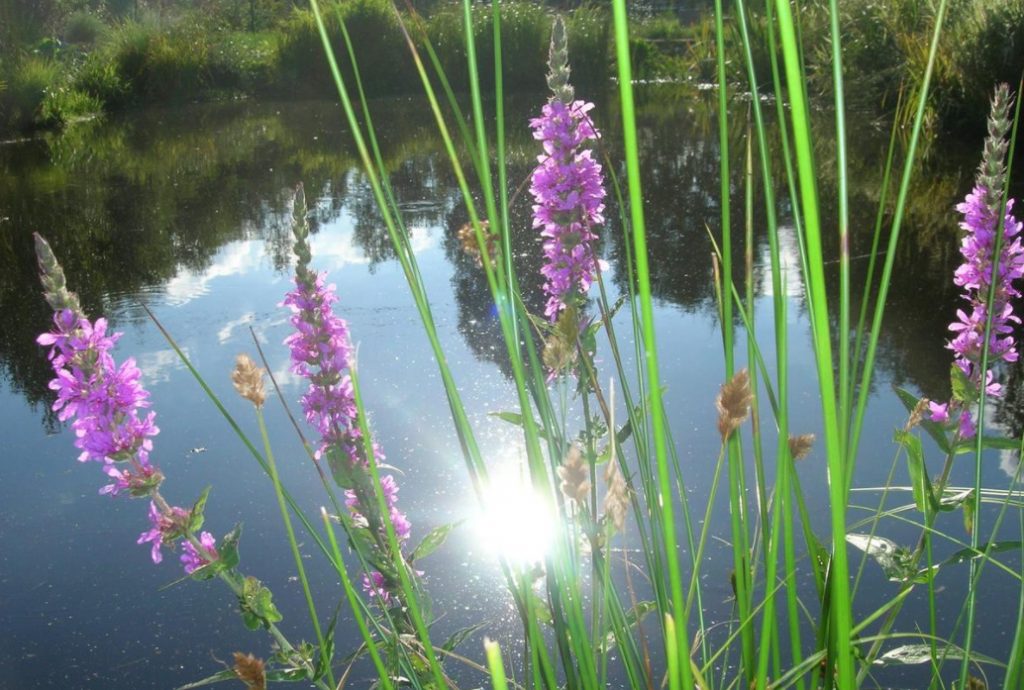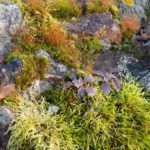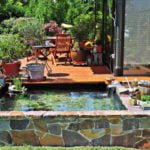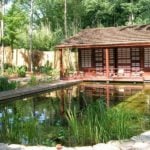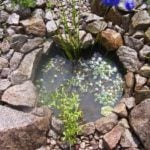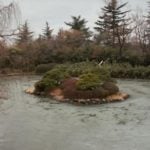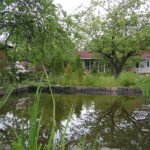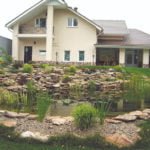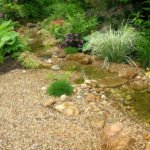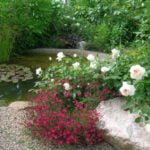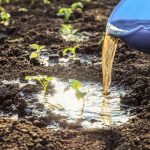The shore of a natural reservoir: problems and solutions
When constructing an artificial pond, the task of primary importance is to carefully decorate its edges, regardless of what exactly is used: a plastic mold or a film made of butyl rubber. A poorly decorated edge will negate all the efforts made and will hopelessly spoil the impression.
A natural pond, of course, does not need this, thus demonstrating one of its undeniable advantages. But its banks, in turn, require strengthening. Otherwise, there is a risk of one day being in the water along with a landslide.
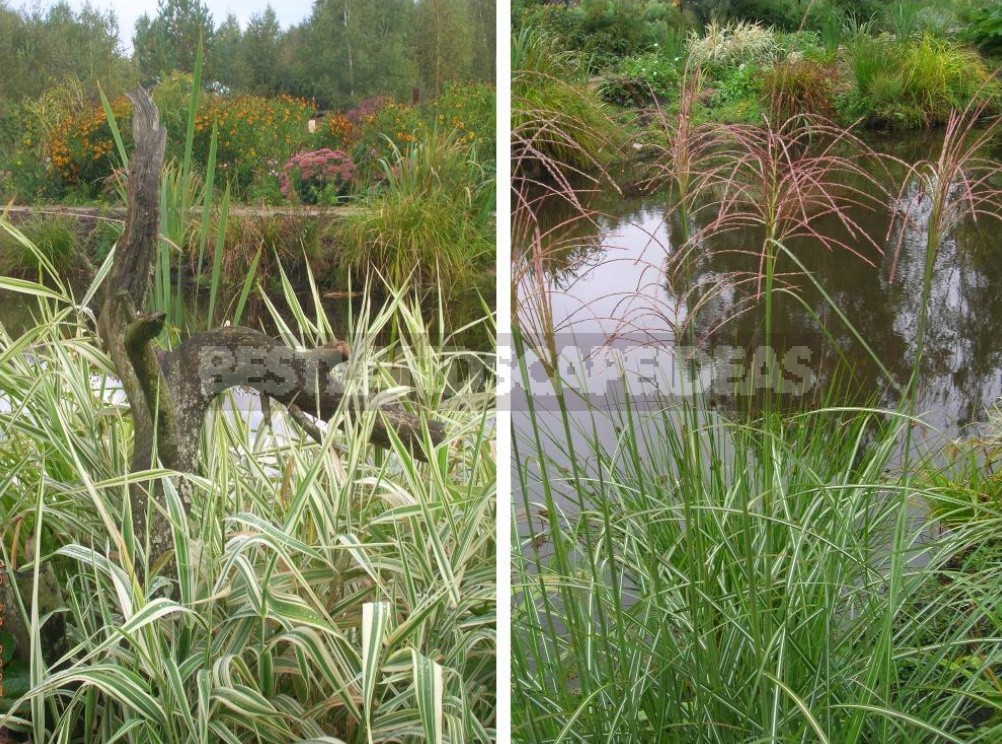
Fortunately, this problem can be solved without the use of technical means. The already mentioned sedge and company perfectly hold the shore, preventing its erosion. A smart approach helps turn them from enemies to allies by limiting the spread of these plants to just a narrow coastal edge.
Alisma plantago-aquatica and Lythrum salicaria are equally good at this task. The latter is also remarkable for the fact that it pleases with lush flowering in late summer, when most of the plants of the coastal zone have long since faded. To this list, it is worth adding moisture-loving cereals, such as Glyceria aquatica, Phalaris arundinacea and magnificent Miscanthus, which also prefer moistened soils. When in autumn the panicles of the miscanthus inflorescences, like banners, wave against the background of the water surface and are reflected in the mirror of the pond, it has no equal in beauty and grandeur.
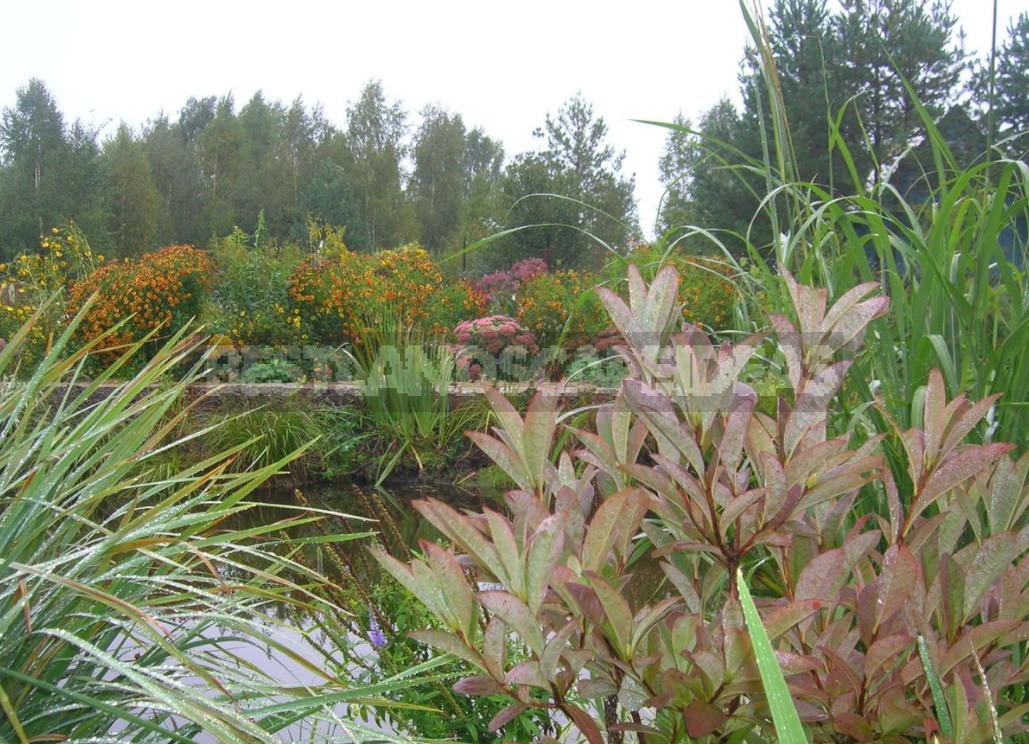
If the coast is flat and too swampy, it is better to use Calla palustris. Over time, it will form a dense, beautiful thicket, such as you will not see in any artificial pond, and will clearly define the boundary between the “firmament of the earth” and the place where it is better not to step in order to avoid trouble.
Other marsh plants will also help to mark this border. The choice for a natural pond is very large. Some of them can make a lasting impression on your friends and acquaintances. For example, Cicuta virosa — the famous hemlock, the poison of which, according to literary sources, was poisoned by Socrates. Of course, it is not necessary to tell anyone that the Greeks actually meant Conium. Let the guests respectfully admire the refined landmark with its elegant feathery leaves and delicate umbrella inflorescence. Cicuta virosa is non-aggressive, so unlike whitefly, it is perfectly suitable for small ponds, but it is still not worth starting it in the garden if there are small children in the family.
How to clean a natural pond and the water in it
Natural ponds have another serious drawback — silting. Over time, the depth of the reservoir can significantly decrease due to the accumulation of bottom sediment, so from time to time the pond needs cleaning. To do this, first of all, you need to pump out the water. If the reservoir is quite large, then you can not do without equipment in this difficult task. A small pond can be cleaned on its own.
Every year, we choose a time when it is dry hot weather, wait until the water level drops as much as possible, and, pulling on wading boots, clean the bottom of our “hole”with a shovel. The “mud” extracted during this event is an excellent natural fertilizer, which is immediately used in flower beds and in flower beds. In addition, an unattractive, seemingly, business turns into unrestrained fun, because adults, willy-nilly smeared, as if they return to childhood, remembering how they loved to mess around in roadside ditches and puddles, and with a light heart arrange a real “holiday of disobedience”.
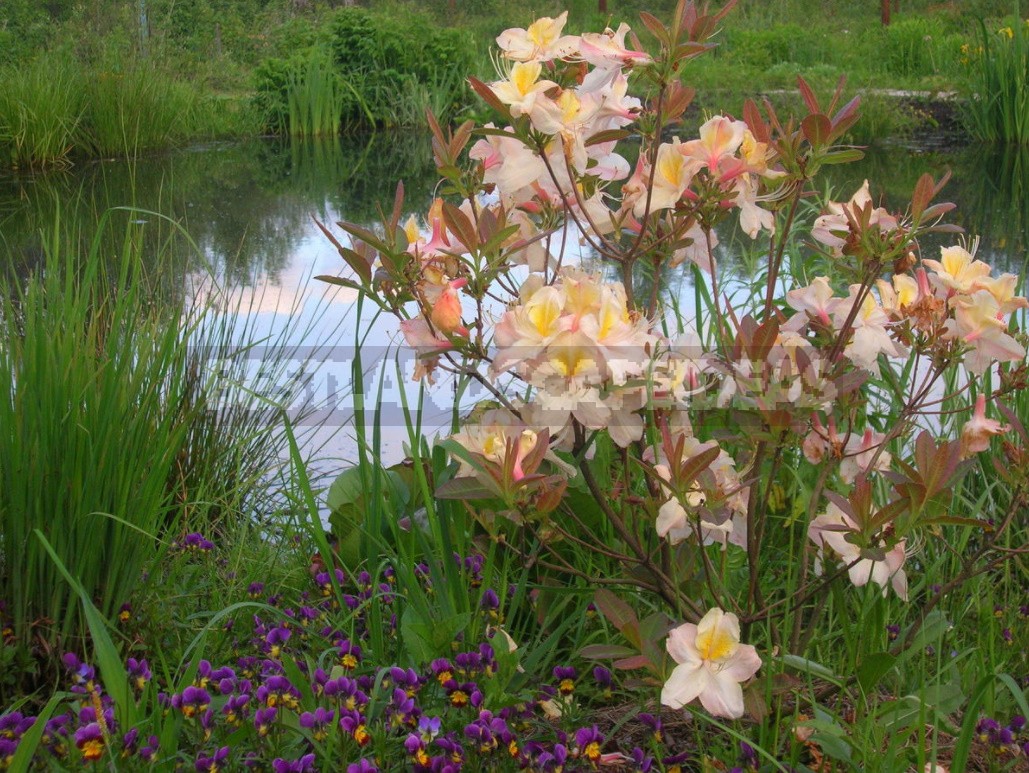
But to solve the problem of water purification in a natural pond, in my opinion, is much easier than in an artificial pond. In any case, no additional costs will be required for this. Instead of filters, aerators and special additives that prevent “blooming”, it is enough to settle oxygenating plants in the reservoir. They enrich the water with oxygen, small particles of suspension settle on their leaves, which are necessarily present in the water, so in some ways they can compete with complex and expensive filtration systems.
The easiest way to deal with Ceratophyllum demersum. It is enough to throw its cuttings into the water, and then from time to time thin out the thickets with an ordinary rake, which we successfully do. Potamogeton and Elodea can also be mentioned, but the latter should be handled very carefully. This guest from across the ocean is not without reason called the ” water plague»: the speed with which it captures new territories is amazing.
However, oxygenating plants are likely to settle in a natural pond on their own, without any help. Perhaps they will get there during the spring flood, or maybe they will be brought in by birds, as happened in our case. Birds will certainly appear near the pond, and the larger the area of the pond, the higher the probability of seeing quite rare guests for the garden.
Life in and around the pond
And here it is time to say about the main advantage of a natural pond, a dignity so weighty that for its sake it is worth not only reconciling with certain inconveniences,but also working hard. A natural swimming pond is a natural ecological community, located directly beneath the Windows of your home. From dawn until late in the evening, when bats begin to fly silently over the water, grabbing swarming midges, you can observe the life of the reservoir in all its details, making new discoveries every day and admiring the wonders stored in the piggy bank of nature.
Of course, this natural community is influenced by humans, but in this case, this influence is not so significant and consists mainly in the introduction of plants that are not typical of this area. But how many charming “savages” will grow up on the banks without any intervention from your side!
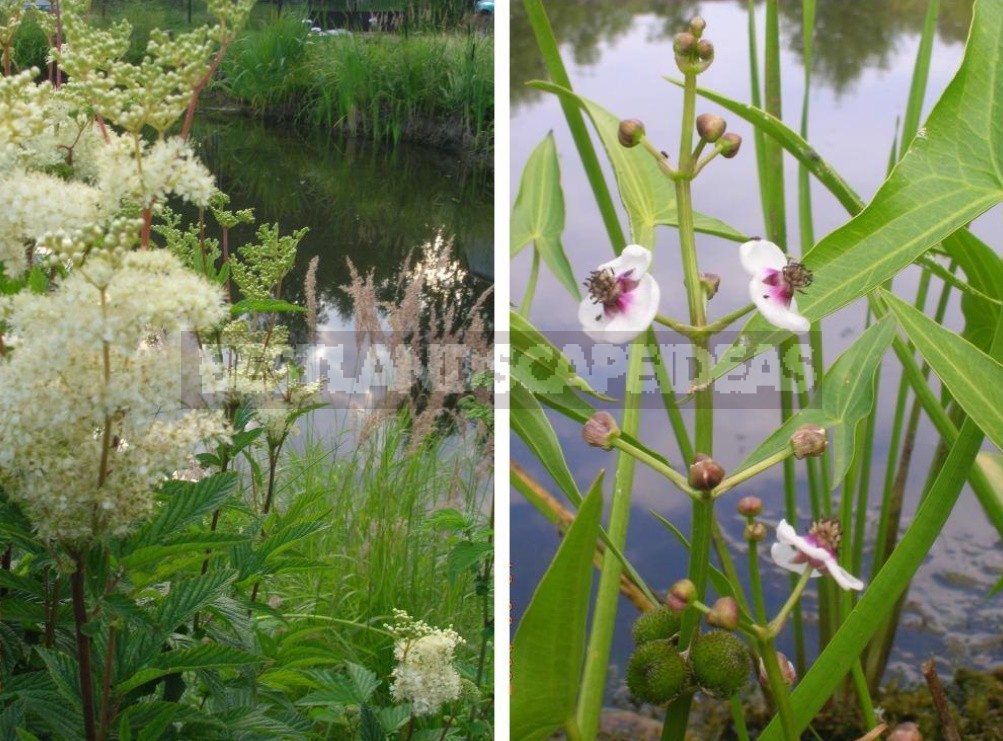
Filipendula ulmaria and the gentle but stubborn Solanum dulcamara, the delicious Sagittaria sagittifolia and the refined Geum rivale, the “blue-eyed” Veronica beccabunga and the persistent Lysimachia nummularia will spread a golden carpet at your feet. “Weeds!” someone will say dismissively. Well, there is some truth in this, but many of the ornamental plants, so beloved by gardeners, are also considered weeds in their homeland. You can trust me: the plants that sometimes do not pay attention to, once on the shore of the pond, will sparkle with new colors and give your garden a special charm.
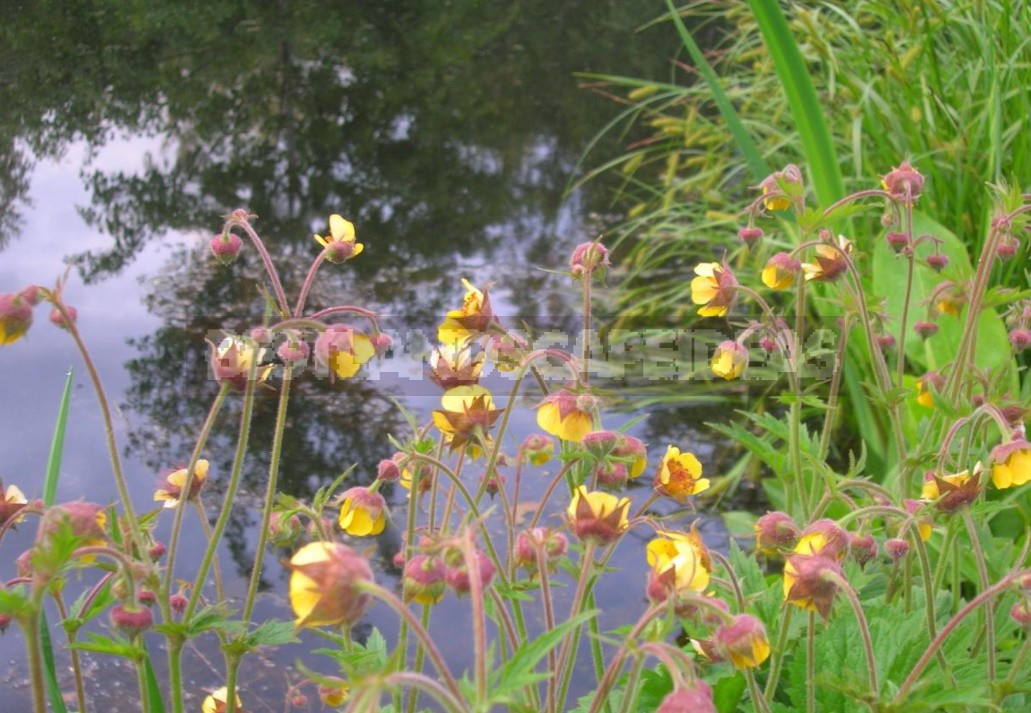
Of course, a natural pond creates very favorable conditions for the development of mosquito larvae. But if there are mosquitoes, then there will be beautiful dragonflies with iridescent mica wings in the sun. So, there will be lively frogs and important toads that will help you in the difficult fight against pests and will announce the spring garden with their friendly choir. Busy grass snakes can settle in, and if you do not bother them with excessive attention or empty fears, once they get used to it, they will also stand up for the garden, destroying over-bred mice.
No other garden idea will bring so much genuine joy to the child. We often forget how difficult it is for a restless, inquisitive little man to wander along neat paths among perfect flower beds. A natural pond will occupy his attention, teach him to live in harmony with nature, and help him develop such useful qualities as observation and patience.
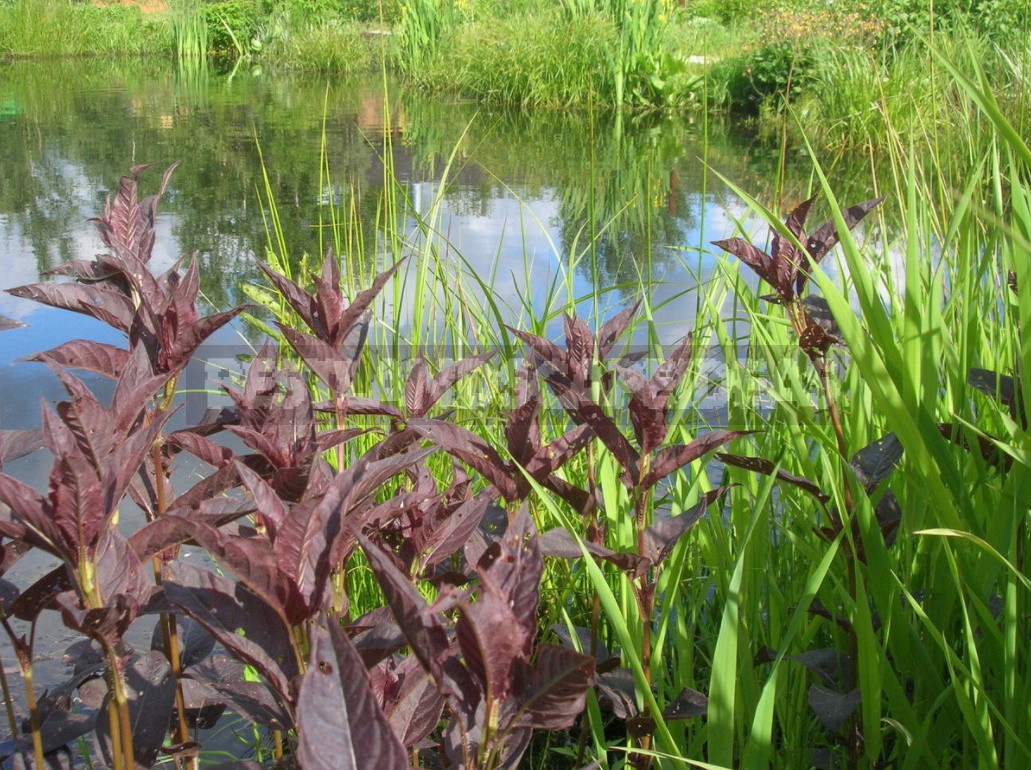
For several years we have lived side by side with a muskrat. This indefatigable animal gives us a lot of trouble, arranging burrows under the shore, digging flower beds, building a system of tunnels. But this is nothing compared to the delight of my son, who for the first time saw how noiselessly, like the periscope of a submarine, a whiskered face appears out of the water.
My restless boy was sitting on the bank, holding his breath, when the wild ducks landed on the pond. He stood motionless, watching the ducks dive, brush their feathers, and finally fall asleep in a thicket of Carex and Iris pseudacorus. Fascinated, he watched the mating dance of the snakes, circling in the water like animated heroes of fairy tales.
The garden, as you know — is a reflection of the owner. In the mirror of the garden pond, the reflection multiplies, allowing you to look through the Looking Glass, to see different facets of your own “I”. And a natural pond, in which there is nothing superfluous and alien, will certainly help you find your true self again, without glamour and superficial gloss. Just lean over the water and look at your reflection.
